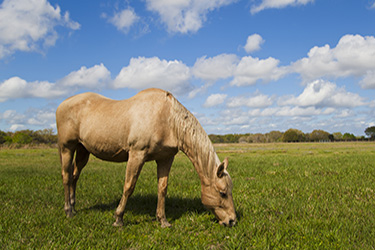West Nile Virus: A Risk for Horses

West Nile virus in North America
The West Nile virus was first diagnosed in U.S. horses in 1999. Since then, thousands of cases of equine West Nile virus encephalomyelitis have been reported in the United States, with a 30-40% fatality rate. West Nile is endemic in all areas of North America, and low incidence rate does not negate the risk for horses.
West Nile in horses
West Nile has an incubation period of three-15 days in horses. Horses that have been infected exhibit many symptoms. Clinical signs may include: fever, ataxia, depression, apprehension, stupor, behavioral changes, limb weakness, partial paralysis, droopy lip, teeth grinding, muscle twitching, muscle fasciculation, muzzle tremors, difficulty rising, recumbency and convulsions. The worst cases can result in blindness or death. Forty percent of horses that survive acute illness experience residual effects such as gait and behavioral abnormalities.
Vaccinations
Risk of exposure and geographic distribution varies yearly. Therefore, all horses in North America are recommended for immunization. Diagnostic blood tests include: plaque reduction neutralization (PRNT), virus neutralization, hemagglutination inhibition, complement fixation, ELISA and antigen (IgM and IgG) capture ELISA.
The American Association of Equine Practitioners provides core vaccination guidelines to protect from diseases endemic to specific regions, particularly those with a potential risk to public health. West Nile equine vaccinations have been identified as core in AAEP guidelines along with Eastern and Western sleeping sickness, tetanus and rabies. The recommended vaccinations include:
-
Inactivated whole virus vaccine: primary series of two doses to previously unvaccinated horses, with 4-6 week interval between doses. Revaccinate in one year
-
Recombinant canarypox vector vaccine: primary series of two doses to previously unvaccinated horses, with 4-6 week interval between doses. Revaccinate in one year
-
Inactivated flavivirus chimera vaccine: primary series of two doses to adult horses, with 3-4 week interval between doses. Revaccinate in one year
Additionally, remind your clients of the benefits of working with you to administer vaccines. Many are tempted to purchase vaccines at lower cost and administer them without the assistance of a professional. Here are a few points you can reiterate to convince them to work with you:
-
They’ll know the vaccines have been properly stored and handled to maintain efficacy.
-
Vets are apprised of the safest vaccination schedules.
-
Vets are more experienced with safe injection techniques to minimize side effects.
-
Vets can effectively monitor and treat any reactions or side effects.
Understanding post vaccination care is another important aspect of the vaccination process. Potential side effects include: low-grade fever, decreased appetite, fatigue or decreased energy and tenderness at the injection site. Twenty to thirty minutes of exercise following vaccination is recommended to increase blood flow to the muscles, and minimizing strenuous activities for two-three days allows for a good immune response.
Eastern and western equine encephalomyelitis (EEE and WEE) are also endemic to eastern, southeastern, western and mid-western states. Cases also have been reported in some southern states. Like West Nile, these viruses are transmitted to horses via mosquitoes that have bitten infected wild birds or rodents. The risk of exposure varies, but the proper vaccinations are also recommended by AAEP.
Non-invasive preventive measures
Vaccinations are the most important step in preventing West Nile virus. However, there are a few other techniques you can provide to your clients to help them reduce the risk of exposure. Consider these tips:
-
Reduce or eliminate standing or stagnant water accumulation
-
Keep horses in barn from dusk until dawn to prevent bites
-
Set mosquito traps
-
Oscillate air with fans
-
Remove organic debris
-
Apply topical mosquito repellents approved for equines
-
Administer vaccinations as recommended as core vaccine for all horses in North America
Click here to access all the core vaccination guidelines from AAEP.
Contact your Covetrus representative for more information at 855.724.3461 or online.
Sources
https://aaep.org/guidelines/vaccination-guidelines/core-vaccination-guidelines
https://aaep.org/horsehealth/west-nile-virus-vaccination-guidelines
https://www.bi-vetmedica.com/species/equine/resources/vaccinating_yourhorse.html
https://www.veterinarypracticenews.com/more-clients-vaccinating-own-horses/


Working Here
Our team members are encouraged to be the best they can be... at Covetrus we believe we impact one another.
Learn MoreNews & Events
FDA Cautions Pet Owners Not to Feed Texas Tripe Inc. Raw Pet Food Due to Salmonella, Listeria Monocytogenes
The U.S. Food and Drug Administration is cautioning pet owners not to feed their pets any of the Texas Tripe brand raw frozen pet food listed below because several samples of Texas Tripe raw pet food have tested positive for Salmonella and/or L. mono.
Careers
Are you looking for a place to let your talents shine? At Covetrus, we help our practitioner customers better serve their patients and take pride in providing the best customer experience possible. Search our open positions to see our available opportunities.
Newsletter
Stay current with what’s going on with Covetrus, subscribe to receive our newsletter and email communications. Subscribers will receive the latest information in practice management, sales and marketing, animal health, and more.



-3-(1).png?sfvrsn=2d806d73_0)
